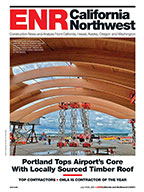
Maine DOT Idea sharing without negotiation pushed project.
|
Portland, Maine’s Ocean Gateway project integrates ship and shore development to enhance the city’s waterfront economy. But cost limitations and a state law banning negotiations with bidders caused authorities to use a novel Value Analysis Alternative Proposals approach.
Ocean Gateway develops the former Bath Iron Works dry-dock facility, including the Maine State Pier and the Casco Bay Island Ferry’s facilities, into a multi-modal transportation complex. “What this does is provide us with a first-class ferry facility and cruise-ship terminal,” says Joseph E. Gray, Portland city manager. The city modified zoning to permit private mixed-use development, he notes.
Phase I consists of a $24-million city/state partnership that has driven over $200 million of private investment. The public work consists of a new 15,000-sq- ft cruise-ship terminal, 23,000 sq ft of pier expansions and a 130-ft-long two- lane roll-on/roll-off ferry bridge, plus support facilities. Private developers have broken ground on a five-level parking structure and a mixed-use condo/commercial facility, and they plan to redevelop four vacant industrial parcels into hotel and mixed-use structures.
The Maine Dept. of Transportation in 2000 hired Woodard & Curran, Portland, and BEA International, Coral Gables, Fla., to complete a master plan and serve as program manager. The public project started off as a design-bid-build deal but ended up being bid twice. In March 2005, the city and state received three bids, all rejected because they were over budget. Officials then issued a request for proposals and used VAAP as a modified approach in which contractors made confidential suggestions to the design team to reduce costs.
VAAP items were deducted from the base bid, which became a design-build deal that MaineDOT awarded to Reed & Reed, Woolwich. “The prequalified bidders were allowed to make suggestions on improving construction techniques, changing materials and structural components, which we reviewed as either having merit or no merit,” says Paul D. Pottle, MaineDOT project manager.
The state does not allow negotiations with bidders, so VAAP was viewed as a way to exchange ideas without negotiations. “By keeping numbers out of the equation, we could see what the ideas were but were not influenced by any potential savings,” says Pottle. Unsuccessful firms received a stipend, so the state allowed the winner to adopt other VAAP ideas as value-engineering proposals for a 50:50 shared savings.
Phase II will create a new mega-berth for cruise ships and perhaps a fast, major- hub inter-coastal ferry service costing about $10 million. Private hotel/conference centers totaling $90 million could follow. “Without VAAP, the initial award could not have been made, and there would have been no subsequent investment,” says Pottle.



Post a comment to this article
Report Abusive Comment